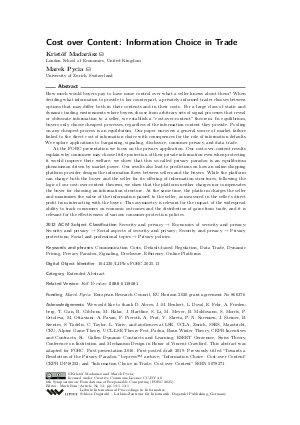Cost over Content: Information Choice in Trade (Extended Abstract)
Authors Kristóf Madarász, Marek Pycia
-
Part of:
Volume:
6th Symposium on Foundations of Responsible Computing (FORC 2025)
Part of: Series: Leibniz International Proceedings in Informatics (LIPIcs)
Part of: Conference: Symposium on Foundations of Responsible Computing (FORC) - License:
 Creative Commons Attribution 4.0 International license
Creative Commons Attribution 4.0 International license
- Publication Date: 2025-06-03
File

PDF
LIPIcs.FORC.2025.13.pdf
- Filesize: 320 kB
- 1 pages
Document Identifiers
Related Versions
Subject Classification
ACM Subject Classification
- Security and privacy → Economics of security and privacy
- Security and privacy → Social aspects of security and privacy
- Security and privacy → Privacy protections
- Social and professional topics → Privacy policies
Keywords
- Communication Costs
- Default-based Regulation
- Data Trade
- Dynamic Pricing
- Privacy Paradox
- Signaling
- Disclosure
- Efficiency
- Online Platforms
Metrics
- Access Statistics
-
Total Accesses (updated on a weekly basis)
0PDF Downloads0Metadata Views
Abstract
How much would buyers pay to have some control over what a seller knows about them? When deciding what information to provide to her counterpart, a privately-informed trader chooses between options that may differ both in their contents and in their costs. For a large class of static and dynamic trading environments where buyers choose from arbitrary sets of signal processes that reveal or obfuscate information to a seller, we establish a "cost-over-content" theorem. In equilibrium, buyers only choose cheapest processes, regardless of the information content they provide. Pooling on any cheapest process is an equilibrium. Our paper uncovers a general source of market failure linked to the direct cost of information choice with consequences for the role of information defaults. We explore applications to bargaining, signaling, disclosure, consumer privacy, and data trade. At the FORC presentation we focus on the privacy application. Our cost-over-content results explain why consumers may choose little protection of their private information even when protecting it would improve their welfare; we show that this so-called privacy paradox is an equilibrium phenomenon driven by market power. Our results also lead to predictions on how an online-shopping platform provider designs the information flows between sellers and the buyers. While the platform can charge both the buyer and the seller for its offering of information structures, following the logic of our cost-over-content theorem, we show that the platform neither charges nor compensates the buyer for choosing an information structure. At the same time, the platform charges the seller and maximizes the value of the information passed to the seller, as measured in the seller’s direct profit from interacting with the buyer. This asymmetry is relevant for the impact of the widespread ability to track consumers on economic outcomes and the distribution of gains from trade, and it is relevant for the effectiveness of various consumer-protection policies.
Cite As Get BibTex
Kristóf Madarász and Marek Pycia. Cost over Content: Information Choice in Trade (Extended Abstract). In 6th Symposium on Foundations of Responsible Computing (FORC 2025). Leibniz International Proceedings in Informatics (LIPIcs), Volume 329, p. 13:1, Schloss Dagstuhl – Leibniz-Zentrum für Informatik (2025)
https://doi.org/10.4230/LIPIcs.FORC.2025.13
BibTex
@InProceedings{madarasz_et_al:LIPIcs.FORC.2025.13,
author = {Madar\'{a}sz, Krist\'{o}f and Pycia, Marek},
title = {{Cost over Content: Information Choice in Trade}},
booktitle = {6th Symposium on Foundations of Responsible Computing (FORC 2025)},
pages = {13:1--13:1},
series = {Leibniz International Proceedings in Informatics (LIPIcs)},
ISBN = {978-3-95977-367-6},
ISSN = {1868-8969},
year = {2025},
volume = {329},
editor = {Bun, Mark},
publisher = {Schloss Dagstuhl -- Leibniz-Zentrum f{\"u}r Informatik},
address = {Dagstuhl, Germany},
URL = {https://drops.dagstuhl.de/entities/document/10.4230/LIPIcs.FORC.2025.13},
URN = {urn:nbn:de:0030-drops-231409},
doi = {10.4230/LIPIcs.FORC.2025.13},
annote = {Keywords: Communication Costs, Default-based Regulation, Data Trade, Dynamic Pricing, Privacy Paradox, Signaling, Disclosure, Efficiency, Online Platforms}
}
Author Details
Funding
- Pycia, Marek: European Research Council, EU Horizon 2020 grant agreement No 866376
Acknowledgements
We would like to thank D. Abreu, J.-M. Benkert, L. Doval, E. Fehr, A. Friedenberg, T. Gan, R. Gibbons, M. Halac, J. Hartline, S. Li, M. Meyer, B. Moldovanu, S. Morris, P. Ortoleva, M. Ottaviani, A. Pavan, F. Pieroth, A. Prat, V. Skreta, P. N. Sørensen, J. Steiner, B. Szentes, S. Tadelis, C. Taylor, L. Yariv, and audiences at LSE, UCLA, Zurich, SSES, Maastricht, CEU, Alpine Game Theory, UCL-LSE Theory Fest, Padua, Bonn Winter Theory, CEPR Incentives and Contracts, St. Gallen Dynamic Contracts and Learning, ESSET Gerzensee, Swiss Theory, Conference on Institution and Mechanism Design in Honor of Vincent Crawford. This abstract was adapted for FORC. First presentation 2016. First posted draft 2019. Previously titled "Towards a Resolution of the Privacy Paradox," https://web.archive.org/web/20250409133518/https://works.bepress.com/kristof_madarasz/47/; "Information Choice: Cost over Content" https://cepr.org/publications/dp18252; and "Information Choice in Trade: Cost over Content" https://papers.ssrn.com/sol3/papers.cfm?abstractid=5078271.
